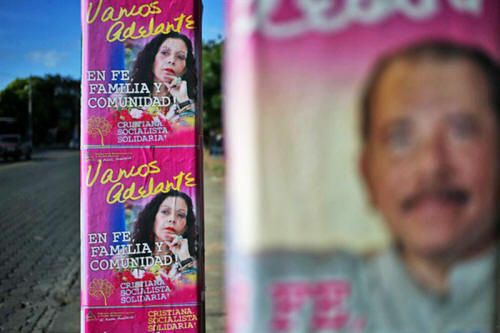|
by Christine Wade November 17, 2016 from WPR Website
Political posters of Nicaraguan President Daniel Ortega and his wife, Vice President-elect Rosario Murillo, on a building in Managua, Nicaragua Nov. 7. 2016 (AP photo by Esteban Felix)
On Nov. 6, Nicaraguan President Daniel Ortega of the ruling Sandinista National Liberation Front, or FSLN, was re-elected to a third consecutive term, his fourth overall since 1984.
There was
little doubt about the outcome of the election given his
overwhelming popularity and the lack of any viable opposition.
Though Nicaragua's characteristically high voter turnout was
down to 68 percent, Ortega
won 72 percent of the vote.
In 2014, a constitutional amendment provided for indefinite re-election, while victories at the ballot box in 2011 and 2012 ensured that the FSLN controlled the country's institutions.
Court decisions in 2016 transferred leadership of the main opposition party to a historical faction within the party; its deputies were then required to vacate their seats in the National Assembly after they refused to recognize or meet with the new party leadership.
For his detractors, Ortega naming
his wife, Rosario Murillo, as vice-president was merely the coup
de grace to the facade of democracy in Nicaragua.
Whether Ortega can hold onto this popularity remains to be seen.
Some factors are out of his control:
Nicaragua is one of several Latin American countries that have amended laws on term limits and re-elections in recent years, including,
Following the region's transitions to democracy in the 1980s, many new civilian constitutions prohibited consecutive re-election, while a few permitted a single nonconsecutive term.
The prohibitions were a response to military regimes and dictatorships during the 1960s and 1970s.
But less than a decade later, countries throughout the region began to amend these rules. Now, most countries allow presidents to be elected more than once, in some form - either two consecutive terms or nonconsecutive terms.
Only,
...prohibit re-elections altogether, while only Nicaragua and Venezuela permit indefinite re-election.
Last February, a bid by
Bolivian President Evo Morales to run for another term was
defeated in a popular referendum, but Morales said this week
that
he anticipated another referendum on re-election would be
held soon.
That cleared the way for President Juan Orlando Hernandez to run again, and last week he accepted the nomination of the ruling National Party to be its candidate in next year's elections.
His announcement comes in spite of the fact that no legal procedures have been approved for re-election. Honduras' Congress has yet to determine whether re-election will be permitted for consecutive or nonconsecutive terms. Nor has it fixed the number of permissible terms.
Moreover, despite the court's
ruling, the language banning re-election is still in the
constitution, and there's no clear sense of a procedure to
change it.
Across Latin America,many citizens see legislaturesas impediments for progress;for some they are even expendable.
Opposition leaders and members of civil society oppose Hernandez's nomination, claiming the ruling is not valid because the court does not have the power to amend the constitution.
Student protesters opposing
his re-election bid
have clashed with police in recent days.
The opposition claimed that Zelaya's move was a Chavez-style attempt to hold onto power, despite the fact that the poll would not have had any impact on the elections already scheduled for later that year.
That same opposition now
supports Hernandez's re-election, while Zelaya's left-wing Libre
party opposes it.
A statement from the U.S. Embassy in Honduras read,
This is curious given that
Hernandez used a court that he stacked with partisans to get the
re-election ruling he wanted - the same scenario that resulted
in
scathing U.S. criticism of Ortega.
After all, only in a handful
of circumstances have Latin American presidents sought to extend
their time in office - such as Venezuela's Huge Chavez and
Colombia's Alvaro Uribe, along with Morales and Ortega - and not
all of them have been successful.
This system is supported by popular attitudes toward government institutions. Across Latin America, many citizens see legislatures as impediments for progress; for some they are even expendable.
But analysts like the
Brookings Institution's Daniel Zovatto
warn of the danger that this combination of
hyper-presidentialism and re-election poses to liberal democracy
in the region.
Some view Ortega's appointment of his wife as his vice president as an attempt to cement a line of succession, and he wouldn't be alone in doing so.
Other recent first ladies have succeeded their husbands in office, like Cristina Fernandez de Kirchner in Argentina, or attempted to, like Sandra Torres in Guatemala.
Earlier this year, Keiko Fujimori, the daughter of Peru's former President Alberto Fujimori, who also served as Peru's first lady, lost her second bid to become president. Of course, Fujimori himself also had controversial re-election bids.
In Honduras last week, Zelaya
announced that his wife, Xiomara Castro, who ran against
Hernandez in 2013, would be Libre's 2017 presidential candidate.
Latin America's political parties have long been viewed as vehicles for self-promotion, nepotism and corruption; the re-election trend does little to dispel that perception.
If they are to survive, opposition parties need to develop deeper roots and cultivate new leaders for the future.
|


